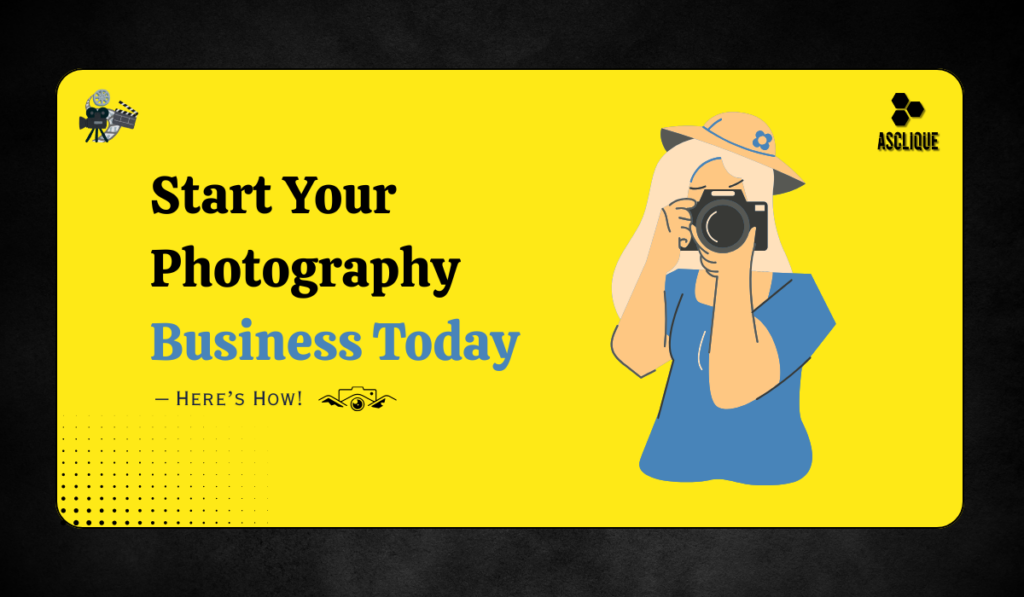Starting a photography business is a thrilling way to marry your creativity with business. In a visually driven world where content rules everything from marketing to memories, photography is in demand. From weddings, portraits, and real estate to branded content, there’s a need for great imagery expanding every day.
If you’re curious about how to start a photography business, the great news is you can start small and grow gradually. With demand on the rise across industries, photography is no longer an art form—it’s a legitimate career. The U.S. photography market earned more than $11 billion in 2024, IBISWorld reports, with the upward trend predicted to continue for years to come.
Step 1: Define Your Niche in Photography
Before jumping in, spend some time identifying your niche. Selecting a niche helps you concentrate and draw in clients seeking that particular service. Rather than trying to do it all, select what you like and where there is a demand.
Some popular photography niches are:
- Wedding & engagement shoots
- Family, kid, and pet portraits
- Product or commercial photography
- Real estate and interiors
- Food photography for restaurants and cafes
- Travel and adventure
- Fashion and editorial photography
Take time to research your local market. If your area has a flourishing wedding market or emerging small business environment, position your niche to fit.
Step 2: Create a Photography Business Plan
Similar to any other business, a photography business gains from a well-planned vision. You don’t require a 50-page document—but you should have a definitive vision.
Incorporate these main elements in your business plan:
- What services you will provide
- Who your target clients are
- How you’ll charge for your packages
- Your monthly and annual money objectives
- Start-up expenses (equipment, advertising, insurance)
- A straightforward marketing plan
Having a plan not only directs you but also gives you confidence when selling to customers or looking for loans.
Step 3: Invest in the Right Photography Equipment
Finding the proper equipment is essential—but don’t be like me and try to get it all at once. Begin with decent essentials and fill in gear as your business evolves.
Beginner’s essential photography gear:
- A mirrorless or DSLR camera (such as Canon EOS R or Nikon Z50)
- Lenses (a 50mm prime and a zoom lens such as 24-70mm)
- Speedlight or external flash
- Tripod and reflectors
- SD cards, batteries, and backup storage
- Editing software (such as Adobe Lightroom, Photoshop, or Capture One)
Purchase secondhand or rent equipment in order to save money in the early days. A majority of photographers begin with used gear and continue to produce professional work.
Step 4: Register Your Business and Handle Legalities
Making your hobby into a legitimate business requires getting legal. This establishes credibility with clients and safeguards your assets.
Legal requirements are:
- Selecting a business name and filing it
- Obtaining a local business license
- Opening a business bank account
- Obtaining an EIN (Employer Identification Number)
- Enquiring about an LLC for protection from liability
- Obtaining general liability insurance
- Creating simple client contracts
You may also want to speak with an accountant to understand your tax obligations, especially if you’re taking on freelance or full-time work.
Step 5: Build an Impressive Photography Portfolio
A strong portfolio shows potential clients what you’re capable of. Focus on quality, not quantity, and make sure every image in your portfolio reflects your current style and niche.
Tips to build your portfolio:
- Provide free or reduced-price shoots to friends, family, or neighborhood businesses
- Select a platform such as Squarespace, Wix, or WordPress to create your website
- Organize images into categories (e.g., wedding, product, lifestyle)
- Add behind-the-scenes or before-and-after photographs
- Add reviews or testimonials as soon as you begin receiving them
72% of clients hire photographers based on the quality of their portfolio, according to Zenfolio’s survey. Ensure yours is professional and showcases your best work.
Step 6: Market Your Photography Business Online and Offline
Your business really picks up speed here. You may have great photos, but unless people view them, it’s difficult to acquire clients. Blend online with offline strategies to grow faster.
Effective marketing methods:
Online:
- Build a clean website with local SEO optimization
- Utilize Google Business Profile to show up in local searches
- Post regularly and share client testimonials or behind-the-scenes
- Posting social ads targeting your locality
Offline:
- Attend local events, expos, or artistic meetups
- Leave cards or flyers at local cafes or shops
- Collaborate with wedding planners, event spaces, and makeup artists
- Provide referral discounts for current clients

Another effective offline strategy is to offer Custom Pins featuring your photography brand’s logo or slogan. These small yet eye-catching accessories can be handed out at events, included in client packages, or shared through partnerships with local businesses, fostering a sense of belonging and building community loyalty among clients and fans.
Custom pins are not only a memorable symbol of your services but also a subtle yet powerful marketing tool. Clients who wear or display your pins will naturally promote your brand in their own circles. This approach adds an element of personalization and professionalism to your marketing strategy, helping you stand out in a competitive market.
Future Scope of the Photography Business
The photography world is evolving rapidly—and that’s a positive. New technology and equipment translate into more ways to develop your business and provide valuable services.
New photography trends to keep an eye on:
- Drone photography: Used more and more in real estate, tourism, and events
- AI photo editing software: Faster processes and superior retouching
- Virtual tours and 360-degree photos: Crucial for real estate and e-commerce
- Hybrid services: Video and motion photography are on the rise
- Subscription content: Continuous visual content for brands and influencers
Photography is going to remain crucial across sectors. With constant updates on trends and new skills, you can future-proof your business.
Conclusion
Going into business as a photographer can seem daunting at first, but dividing it into concise steps makes it feasible. From deciding on what niche of photography you want to specialize in to developing your portfolio and promoting your services, every step leads you closer to converting your passion into a solid income stream.
If you’ve been wondering how to start a photography business, this manual provides the foundation. Don’t forget that success is not being able to afford the most expensive camera—it’s consistency, learning along the way, and arriving in creativity and professionalism.
FAQ’s
Do I need a degree to start a photography business?
No. Your ability, experience, and body of work are so much more important than education. Most successful photographers are self-taught.
How much money do I need to start a photography business?
You can start with an entry-level setup and marketing budget for about $1,500–$3,000, depending on what equipment and software you have available.
Can I run my photography business from home?
Yes. Most photographers work from home and use locations outdoors or rent a studio as required. Just ensure that you have an ideal storage and editing arrangement.
How do I find my first clients?
Begin with people you know—family, friends, and local businesses. Use social media to highlight your work and connect with others in complementary industries.

